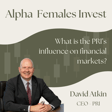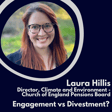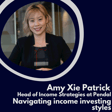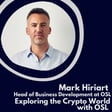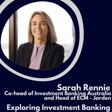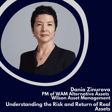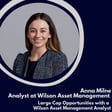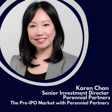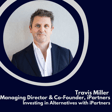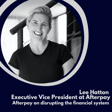Introduction to Alpha Females Invest
00:00:03
Speaker
Welcome back to the Alpha Females Invest podcast. Two females working in the finance industry searching for alpha. My name is Clooney. And my name is Emily. And together we bring diversified perspectives from the buy and sell side of the finance world. One of the aims of this podcast is to help elevate female voices in the finance industry to promote gender diversity. The content is of course aimed at all genders, but we really wanted to provide exposure to top female talent in finance.
Featuring Daniella Crolini
00:00:32
Speaker
We are really excited to welcome another great female in finance on the show today, Daniella Crolini, who is founding principal at Baron Joey. To date, 60% of our guests have been female, which we're really proud of. So as usual, any information discussed in this podcast is not financial advice. All opinions reflect those of the individuals. You should always read the PDS and talk to a financial advisor who can consider your personal circumstances before you invest.
Daniella’s Career Journey - From Goldman Sachs to Baron Joey
00:01:00
Speaker
Now, to introduce our speaker, Dani has had a wealth of experience, especially on the sell side, and currently works in institutional equities team at Baron Joey Capital, and she focuses on small and emerging companies listed on the ASX. Dani joined Baron Joey from the small caps research sales team at Goldman Sachs, and she has also worked in M&A and ECM over the course of her career. Thanks for joining us, Dani. Thanks, girls. Thanks so much for having me on the show. It's great to be here.
00:01:27
Speaker
We're super excited to talk to you today, Danny. And as I'm sure you've heard from listening to all our other podcasts, it's becoming a bit of a theme that we like to kick it off with your most embarrassing career moment. Em gave hers last week. And we've also heard a few pretty, pretty embarrassing stories from a few of our speakers too. So to level the playing field, could we kick off with your most embarrassing moment? Now, I have so many embarrassing moments over the course of my career and it was
00:01:55
Speaker
trying to find the one, I guess, that was appropriate for a public audience, to be honest. One of my most embarrassing moments, I'd say, would be when I first started in the research sales team at Goldman Sachs. So part of our role, we send out a morning note, which goes to about 900 institutional investors, fund managers, analysts, and the like. And in that morning note, you have desk ideas, summary of research, summary of news overnight. And one of our desk ideas was Bellamy's.
00:02:24
Speaker
which is an infant milk formula riding the wave of the green, clean and green thematic over in China. So in the heading of the email, I wrote key desk ID.
00:02:35
Speaker
Instead of BAL, which was the Bellamy's ticker, I wrote BLA, which is Blue Sky Alternative Investments, which was a fund manager that at the time was under a short attack by a short report offshore and had traded about 80% in value and ended up entering receivership.
00:02:54
Speaker
So I sent out that to 900 clients. That's my presentation to the world. And, you know, safe to say most people thought it was a bit of a joke and actually called in laughing. So it took me a while to get over it, safe to say. What's the Goldman Sachs email recall button like?
00:03:14
Speaker
I feel like if you press recall, you raise more attention to the email. So you're better off just hoping the majority of people ignore you. Definitely a good way to raise your profile. Thanks so much for sharing that, Danny. It makes it just really relatable for all of us to understand that kind of everyone goes through these type of issues, but that is a classic.
Navigating Investment Banking Roles
00:03:34
Speaker
So can you give us a little bit of a background on yourself and how you got into investment banking? So I definitely entered investment banking in a roundabout way. I started my working life as an auditor at Ernst & Young at the ripe old age of 18. I got a job through their cadetship program, had no idea what auditing even meant.
00:03:54
Speaker
And very quickly realized it wasn't really for me. While I was studying at uni and working at EY, I realized that I kind of gravitated more towards the finance subjects versus accounting. And so post uni decided to study my CFA, which is more finance and investment professional focused versus the CA, which is more accounting focused. And through that got a job in M&A at Rothschild.
00:04:17
Speaker
did that for a while before moving into ECM and corporate finance at odds and then ended up in the research sales team at Goldman's after that. So I've been at a few different places and held a few different roles within the structure of an investment bank, I guess.
00:04:33
Speaker
I think that's the perfect answer to lead into my next question, Danny. And as you're well aware, Em and I have both worked at investment banks too. And I sometimes feel often people fail to understand the different divisions of an investment bank. So can you just break down for us what does the institutional equity division do and how does that interact with the other components of an investment bank?
00:04:56
Speaker
It's a really good point because I didn't even know that my job even existed until I started working at an investment bank and saw another division that I thought looked quite interesting. So it is hard to get some perspective from, you know, being an outsider and not working in it. But there are three basic divisions within an investment bank and they all do work quite closely together. So you have the institutional equities division, which includes the sales and trading function. You have the research division and the corporate finance division. And so,
00:05:25
Speaker
The institutional equities division is the public side, so we don't deal with non-public material information. Our clients are fund managers, institutional fund managers, I should say, and we work closely with the research team who would be producing research on things like individual company research, strategy, macro, economic research.
00:05:48
Speaker
And our job is to really work with them to provide insights to the clients to help them generate alpha from their own investment portfolio perspective. On the other hand, we also work with the corporate finance team. Their clients are corporates. And so if one of their corporates would like to raise money through a capital raising and they're a listed company, then we would work with the bankers to place that stock with our clients.
00:06:13
Speaker
So would you say the role, I guess, of research sales is really more like an account captain or team captain where you've sort of got to work with everyone in the team to make sure everyone comes together to sort of achieve the end goal of servicing the client? You're definitely responsible for the account management of the client. There are so many different ways that the roles within an investment bank can help that client. And so someone has to kind of maintain that relationship and just make sure that you connect in the right touch points
00:06:42
Speaker
If a research analyst has put out a really interesting piece, just making sure that the client has seen it because they're very busy people. A lot just goes through their email inbox that they don't necessarily have the time to look at. And so if you can do in a succinct way, know what's important to them and flag it to them to make it most effective use of their time, then I think that's where you really provide value.
Understanding Full Service Brokers
00:07:05
Speaker
That's a great overview and I guess kind of flows on well to our next question on what is the importance of a full service broker to your clients and what value add can you give, I guess, in balancing the broader financial markets? I think that the importance of a full service broker and having worked at a range of different types of financial services firms, as I mentioned, some of which only included the advisory or the corporate finance functions. So I could see this firsthand.
00:07:34
Speaker
I think the advantage really is that a full service broker has the complete toolbox available to be able to fully service the needs of their clients. So within a financial services firm, you deal with a range of investors and they've all got their own different requirements and strategies. And so being a full service broker just increases your ability to service those clients. You can provide them things like research insights, liquidity through the trading desk, risk management tools through derivative products, to name a few.
00:08:03
Speaker
And so the more versatile you are, you can really become a one-stop shop for your clients and therefore more valuable overall.
00:08:12
Speaker
And I think that leads also once again, really interesting with the conundrum that I've always struggled with a little bit about the institutional space first funds management in that when I initially started in the industry, I always thought there was a bit of a duplication of roles. And what I mean there is that you have research analysts on the buy side that research a stock for a portfolio manager. But you also have research analysts on the sell side at the investment banks that do the exact same thing.
00:08:40
Speaker
Can you just talk to us about why you think we need both these roles and how do they interact with one another? I think, you know, at first glance, it does seem like there's a duplication of roles. However, I think when you understand the difference in remits between the two sides, it's easy to see how both of them play an important role and especially to each other. So the buy side's remit is typically much wider than the sell side. So to give you some perspective, the average sell side analyst covers about 10 stocks.
00:09:10
Speaker
while the average buy side analyst covers 30 to 40 stocks. So you can immediately see that the sell side has the ability and the bandwidth to go much deeper and much narrower with their coverage, and they end up becoming quasi experts on their stocks under coverage. While the buy side is not just focused on knowing their stocks under coverage, which is already multiples of the sell side, but they're also trying to piece it all together, trying to work out where consensus sits, what is everyone else thinking,
00:09:39
Speaker
And that's also where a sell side analyst can be helpful because they're in regular contact with a wide range of investors and therefore have the ability to synthesize those discussions and views just to give the buy side an indication as to what a share price might be telling you. Because as we've all seen a share prices reaction to news on the day might have nothing to do with whether it be to companies forecast or stated guidance or even consensus. And it's all to do with whether it beat the buy side's expectations as a whole.
00:10:08
Speaker
Yeah, that's a great summary. And I, like I'm sure many of our listeners have watched The Wolf of Wall Street and it gives a pretty interesting wrap to some of the investment banks.
Debunking Wall Street Myths
00:10:22
Speaker
And I think it's pretty fair to say that the in-store trading floor doesn't really operate that way anymore, but I assume it's still pretty fast paced. So do you find that your job can be stressful? And is there anything like the movie?
00:10:36
Speaker
I definitely don't think it's anything like the movie any day of the week. I'm sorry to say it's nothing like The Wolf of Wall Street. Come on, Daddy, give our listeners a little bit more. Not like I say here. No, but as much like Suits and Billions are not like real life law firms or how hedge funds operate. It's definitely a fast paced environment and you're dealing with information that, you know, has a real time effect on share prices. So you're constantly on your toes and trying to analyze information as soon as it comes out.
00:11:05
Speaker
And there are definitely periods, such as reporting season where you're throwing so much information. You're definitely dealing with higher levels of stress. But I think overall there's a pretty good balance. And I think part of that's also really surrounding yourself with a good team who can support each other during those stressful times and also who you can have some fun with during the not so stressful times.
00:11:26
Speaker
I've got to ask Danny, and we do want to give the goss to our listeners, but is client entertainment still a big part of the job? Do you get to wine and dine at the finest institutions throughout the week? Whining and dining is a perk and can be part of the job, but what I would say is it's not so much entertaining per se, but it's rather about
00:11:48
Speaker
developing relationships and just being able to provide value to your clients from a content and serviceability perspective as you understand their investment process better. And so the more time you spend with them, the better you get to understand them and also how their investment process works. And depending on your client's interest, you know,
00:12:07
Speaker
That could be through playing golf, going for a run, and, you know, sometimes taking them out for lunch as well. You know, there's a range of ways, I guess, you can try to build that relationship, but ultimately fund is a super time pool. They're busy people. The time's valuable. And so if you don't have any value to add to them, then you just won't get that opportunity.
00:12:29
Speaker
I'm definitely a coffee in the morning girl if you want to get into my heart, Danny. You obviously would deal with a variety of different clients and there's plenty of clients out there, so hedge funds, long only funds, super funds. What are the key differences between these clients?
00:12:50
Speaker
So they're all the same in that they take pooled funds from a range of investors, or in the case of an industry super fund, they take pooled retirement savings specifically. However, long only in industry super funds would typically only take long positions, meaning that they can't short a stock, which would require borrowing shares from a stock borrower and selling it, whilst hedge funds can take both longer short positions and they typically use leverage to amplify their returns. However,
00:13:17
Speaker
You know, those are the types of funds, but there is really a range of equity strategies that are employed by clients and they do extend beyond those three categories. So, you know, for instance, we have clients who you wouldn't classify as hedge funds and they have long, short strategies, for example. And so the art of a salesperson is really just to understand your client's process, because as I mentioned before, the more you understand their process, the more value you can add.
00:13:42
Speaker
I guess just moving on from there, we've read a fair bit in the AFR and I think it's becoming a hot topic of conversation about the rise of super funds within Australia and their importance within the investment management space. Historically, a lot of those super funds have given a lot of their money to external managers, but we are increasingly seeing that being brought back in-house. As a result of that, are super funds in your opinion becoming more and more important as a demographic of clients?
00:14:10
Speaker
So Australia is a bit of an outlier globally, just with the scale of its retirement pool. I think we might be the 13th or 14th largest equity market, but have the fourth biggest savings pool in the world. So we're a bit of an anomaly and considering superannuation has been around for 30 odd years. I think what we're seeing now is just an evolution of the industry super funds where the natural step is to internalize, you know, some or all of their thumb.
00:14:37
Speaker
So that does mean that we're dealing with them more directly than we did previously. But I think that this will also just continue to evolve and change with time. An example of this that we've seen recently is just their ability to allocate money to unlisted investments directly, both onshore and offshore. You know, as we've seen by the recent acquisition of Telstra's mobile towers business through a consortium of super funds just last month. And so their influence as asset owners in general is becoming more pronounced.
00:15:06
Speaker
Yeah, it's pretty interesting. And there's plenty of managers out there, super funds and asset managers that have some pretty large funds under management balances. So I guess a key role of the institutional desk is to facilitate large flows when fund managers decide to take a big position or they might be exiting a position. So can you describe to us what a block trade is and how that impacts the market?
00:15:31
Speaker
So our clients can have funds under management, you know, as low as the tens of millions of dollars and all the way up to the hundreds of billions of dollars. And while that's typically spread across a range of different strategies, such as small caps, large caps, you know, long short global, they can still hold very large positions in individual stock names that can be in the hundreds of millions of dollars.
00:15:54
Speaker
which you can imagine sometimes are very hard to move when there's been an investment decision made at the fund manager. So a block trade is typically classified as a single trade that has a value of $10 million or above. So while sales trading is more about price discovery, block trades really about volume discovery and just working out how can we execute that particular volume of shares with as little impact to the market price as possible.
00:16:23
Speaker
So the art of a block trader, which is the name of the trader who would handle these lumpy parcels of shares is to know where the holders of an individual stock lie or who would be a natural acquire of shares so that the block trader can go to the least number of market participants as possible.
00:16:39
Speaker
to cross the trade. So an ideal block trade would be executed at the market price with no impact on the market. However, this isn't always possible. Things depending on the size of the trade, the larger it is, the harder it is to move typically, and also the liquidity levels of the stock. So in smaller companies with less liquidity, it's typically harder to move larger parcels of shares.
00:17:02
Speaker
Changing tact a little bit, Danny, I'd love to get your view on the retail market. I guess the background behind this and I guess the huge phenomenon we saw in the market earlier this year was the rise of the retail market versus the institutional market, or I guess more commonly known as the GameStop saga.
Impact of Retail Investors and GameStop Saga
00:17:21
Speaker
In my opinion, I felt like the retail market delivered a pretty big multi-billion dollar message to institutional investors. But I think reflecting upon the situation, it actually raises some important questions around short selling, which you touched on before, social media and the stock markets itself. So I'd love to know what are your thoughts around that? Do you think there is more need for regulation in the industry around short selling? And how do you see the rise of online trading?
00:17:49
Speaker
Yeah, while it was fascinating, I think, for everyone to see that GameStop saga play out, it did cause havoc for market participants. We actually saw some hedge funds literally withdraw from the market and de-lever because they just couldn't predict whether a stock of theirs, which might have a perfectly reasonable short thesis behind it, would be the next target from the Reddit army.
00:18:12
Speaker
So it was just a really fascinating time for everyone to sit back and just watch the effect of this Reddit army. But I guess regulation, it's never static. It's constantly evolving just to deal with the new issues that we face in the market. And I think you're already seeing that short selling and the release of short reports are a focus of regulators. So ASIC's recently published a new info sheet that's focusing on just that. And so it seems like the regulators are aware of the issue and they're trying to come up with a pragmatic way to deal with it.
00:18:41
Speaker
So their objective is to protect the integrity of the markets and to ensure everyone is informed. And so regulation to that effect, I think makes sense. As the financial markets are complex, you know, financial products are complex, especially in the form of options and derivatives and short selling. So
00:18:59
Speaker
I don't think the answer is to ban market participants as they all help keep the market efficient and have their roles to play within the market. But to the extent some of these recent trends are creating market inefficiencies, especially where market participants aren't necessarily protected or informed, then I think it's going to be a natural focus of regulators.
00:19:18
Speaker
Yeah, that's great. I definitely watched that play out with interest, particularly as the Australian stock with the same ticker, which had nothing to do with GameStop, went crazy. So that was quite funny. Did you buy a bit of GameStop, Em? I did not. I did not, unfortunately. I do know people who did, though. And they still hold it, unlucky. Have they bought a house on it? Hopefully not.
00:19:45
Speaker
So there's a lot of talk about the increased popularity of electronic or algorithm trading at the expense of the high touch desk. So can you take us through what are the key differences between these types of trading? So as I mentioned, we have a diverse set of clients who are looking to fulfill a range of strategies. And so one of the benefits of being a full service broker is that we can assist clients through a range of trading strategies also.
00:20:11
Speaker
And so that comprises portfolio trading, high touch trading, electronic trading, which is also known as low touch trading, as well as block trading capabilities. So the key difference between low touch and high touch trading is really just the ownership of execution. With high touch, the dealer who is the person responsible at an investment fund or a client for handing out the orders and executing the orders, they would call through to the trading desk and give one of our traders the order
00:20:40
Speaker
with a directive as to how to execute the trade or give them the freedom to decide. And then our trading desk would work to get the best outcome for the client, which may involve crossing part of the order or choosing to execute based on other directives provided by the client. So that could be over the day or in line with volume. Now with low touch or electronic trading, instead of handing the order over to one of our traders, the dealer at the investment fund would choose one of our
00:21:07
Speaker
available algorithms to execute the trade electronically without the intervention of a sales trader. And these could be strategies such as VWAP, which is executing over the day, or liquidity seeking, which is for larger or more liquid orders. And the role of the low touch desk is really to provide execution consulting to ensure that the clients understand how to best use algorithms to achieve their trading goals.
00:21:31
Speaker
Moving on to a little bit more about investment banks, I feel like a lot of people understand what an IPO is and when a stock lists on the ASX, but you often hear of the chatter amongst markets of an equity division building the book. Can you break that down for us and the actual role that the equity division plays in bringing a company to market? An IPO process is probably a really good example of just how the three divisions of an investment bank can interact together.
00:22:00
Speaker
And IPO is when a company goes from the private world into the listed world and it lists on an exchange such as the ASX. So the corporate that's listing would be a client of corporate finance. And typically the IPO process involves the raising of money from the public. And so that can either be through the issuing of new shares or sell down of vendors as well. And the offering of those shares and the collecting of demand for those new shares is what is called building the
IPO Process and Equity Divisions Explained
00:22:29
Speaker
And institutions typically lead this process because they're used for price discovery. So they'll determine what the overall valuation of the company should be. And they'll as a result, take on those shares once the company becomes listed.
00:22:44
Speaker
Great, that was interesting because you hear about it a lot, but I'm definitely not involved in that process just on the other side. It's interesting to hear how it works on your end. When I'm buying a share, I go on to, in my case, my ANZ app. I pay $20 to purchase a share and then I'll pay $20 when I want to sell that share.
00:23:05
Speaker
So there's a fee for making a trade. Now, how does this commission rate work in the institutional world? Is it lower? And if it is, why is that the case? Institutional commission rates, they've definitely moved around a lot. There's a wide range of investors and strategies and no real fixed or standard commission rates for clients. However, historically, I would expect it to be the case that, you know, the commission rates institutions have
00:23:32
Speaker
are lower than retail. And this would just be a function of the large value and volumes that in stores move around. And so with scale, like in most industries, you tend to see lower prices. However, it's interesting just to see in this day and age, you're actually seeing trading platforms such as Superhero and Robinhood that are actually offering $0 or very, very low cost brokerage per trade. And so
00:23:56
Speaker
It's interesting because you're actually seeing it go the opposite way now where retail seems to have cheaper commission rates than the institutional market. I need to get off my ANZ app and get onto Superhero maybe. Hopefully we don't see zero commissions in the institutional world anytime soon though, Dani. I'll be out of the job if we do.
00:24:16
Speaker
So we also have spoken about ESG on almost every single episode now and clearly it is a great topic of discussion and one that continues to get a lot of air time.
ESG Concerns in Stock Valuations
00:24:27
Speaker
So from your perspective, are you seeing increased attention around ESG investing and have you seen that have a real impact on the stocks that institutional investors generally now prefer to hold?
00:24:39
Speaker
So ESG is no doubt a huge thematic, and it's definitely one that's here to stay. And I think, you know, probably better for the world as well, if you ask me, but you can already see it having a big impact on share valuations. And the obvious example would just be the effect on the fossil fuel industry. So you've had examples of the biggest fund managers in the world who have come out publicly pledging that they'll be exiting investments with high environmental risks. And that includes thermal coal.
00:25:09
Speaker
And so what you find is the pool of investors that are willing to invest in these kinds of sectors are actually diminishing. And as a result, these investors are requiring higher returns and you're seeing a negative effect on the share prices as a result. So it's pretty interesting to see the valuation differential between the thermal coal price and the valuations of the producers at the moment. You've got the thermal coal price, which is approaching
00:25:34
Speaker
record highs while the valuations of some thermocol producers has halved in recent years. And then conversely, you're seeing the excitement levels towards stocks exposed to environmentally friendly thematics, such as electric vehicles and, you know, through lithium, that's hit all time highs. It's not just about the E, however, you do have social examples, you know, the recent divestment of the Endeavor drinks from Woolies.
00:26:02
Speaker
So Endeavor drinks included the group's bottle shops, pubs, and gaming assets. And that was divested because of the impact those assets had on the valuation of Woolies. And you also have other recent examples such as countries banning the importation of certain products due to human rights concerns throughout the supply chain. And so the level of DD from an ESG perspective that investors are undertaking is definitely increasing. And I think they're really demanding more from corporates. But having said that, we do see a wide range of ESG strategies employed.
00:26:32
Speaker
and finding that there's no real template for how it's assessed. But I imagine we'll continue to see further evolution here. As I mentioned, it's not a thematic that's going away. And it's pleasing actually to see a big driver of this is the investment community and their clients. Yeah, I think that's really well said and some great examples there of just how much impact capital can have on the market and just the weight of capital and how that can play on valuation and pricing.
00:27:00
Speaker
So you're speaking every day with some of the best fund managers in Australia and potentially globally, and they must be talking about some themes. So what thematics are you seeing in the market? What are institutional investors thinking about and looking at right now?
Current Market Themes and Inflation Impact
00:27:18
Speaker
Yeah, I'm very lucky, I'd say, to be surrounded by so many switched on people just from both a client and a colleague perspective. And it's always fascinating just to hear the differing views just across the board.
00:27:29
Speaker
So I'd say besides the ever-changing focus on COVID beneficiaries and losers, which the current lockdowns has definitely brought to front of mind again, I thought we were done with it, but the main discussion I think is probably around just the high levels of inflation that we're currently seeing and whether it's transitory or is it something more permanent, as permanent inflation would result in interest rate hikes, which have a flow and effect to equity valuations.
00:27:55
Speaker
Obviously, at the moment, you've got supply chain constraints and disruptions. You have a labor workforce in geographies unable to work. Well, at the same time, demand is booming due to the amount of stimulus that has been simultaneously unleashed by the major economies around the world. And so the big question is, when we finally get a normalization of activity, will these price rises and wage inflation continue?
00:28:20
Speaker
So obviously, higher inflation is a signal for the Reserve Bank to potentially raise rates. And this impacts the equity market valuations, not only through valuation methods, but there also are sectors that do outperform and underperform in this environment.
00:28:35
Speaker
You know, an obvious one would be the banks who typically borrow short and lend long, just meaning that they can earn more of a spread between what they pay to save us and then what they can earn via lending. And just another example would be insurers who just are able to make a higher margin due to the large amounts of capital they're required to hold just to back the insurance policies they write.
00:28:55
Speaker
Well, I think that's fantastic to hear, Danny, because I reckon that's exactly what Em and I were thinking about regarding the market. So clearly we're just as switched on as Australia's smartest investors. Look, I'm not sure we were exactly thinking that, but it's definitely a thought to process. And I do think COVID is still at the front of minds for a lot of investors across the spectrum.
00:29:17
Speaker
So I definitely think you've made a fantastic contribution to our podcast today. And I know I've even learned a lot. I'm sure Em has too. And I know our listeners would have just been ecstatic to hear all your thoughts on investment banking and institutional broking. So just before we stop there and close off the podcast, like we always ask a beginning question, we always like to ask an ending
Career Advice for Continuous Learning
00:29:40
Speaker
question. And given your myriad of career moves, can you tell us what is your top career tip?
00:29:47
Speaker
I never feel like I'm in a position to be handing out tips, but you know, I'll give it my best. Um, I mean, one of the things I would just say is I think it's really important to make sure you're in a role that you continuously learning. I think it's very easy for people to get comfortable with their positions. You know, they know how to do their job. They're not necessarily learning. And then five years down the track, they've realized that they've kind of stagnated from a development perspective. So I think it's really important just to keep challenging yourself.
00:30:16
Speaker
especially while you're young, I've moved around a few times and I've worked in different divisions of an investment bank and I think I've got a pretty good broad knowledge as a result. That would be my tip if I had to give one. I think it's safe to say M&I are definitely developing our skills on this podcast day-to-day with just the classic technical issues, not even recording it. Yes, and we are doing virtual obviously with the lockdown in Sydney, so that has added some complications. But
00:30:44
Speaker
I think we've done all right. Well, thank you so much, Danny, for coming on and joining us today. We learnt so much. We would love to have you back on another time in the future and hear about how everything at Barren Joy is going if you would come and join us again. It's been great to join you girls. It's really good to see what you're doing. So, you know, I'd love to come back and I really wish you all the best. Thanks, Danny. Have a great evening.


